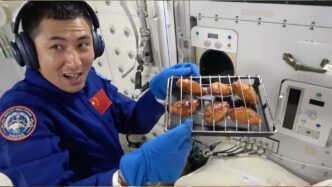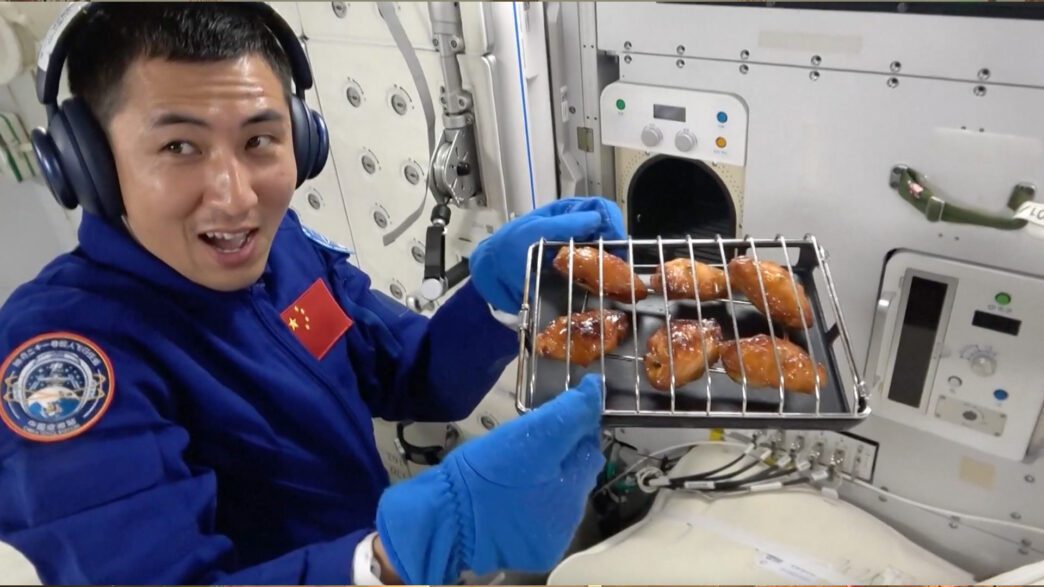Executive Summary
The Story So Far
Why This Matters
Who Thinks What?
Chinese astronauts aboard the nation’s space station recently enjoyed a unique “handover BBQ” featuring freshly baked chicken wings and black pepper steak, prepared in a new hot air oven introduced by the incoming Shenzhou-21 crew. This culinary milestone, part of a broader effort to enhance living conditions in orbit, occurred just as the return of the outgoing Shenzhou-20 mission was delayed due to safety checks following a suspected strike from small space debris on their spacecraft.
Culinary Innovations in Orbit
In the early hours of Tuesday, state news agency Xinhua reported that the six astronauts shared the meal cooked with the new hot air oven. This innovation is a key component of improving the variety, texture, flavor, color, and nutrition of space food, according to researchers.
The historic meal saw marinated chicken wings baked for 28 minutes, followed by steak. Flight engineer Wu Fei, the youngest Chinese astronaut in space at 32, was featured in a Xinhua video removing the roasted wings, describing them as smelling, looking, and tasting “amazing.”
Liu Weibo, a research fellow with the China Astronaut Research and Training Centre, highlighted the motivation behind these efforts. “Imagine if astronauts, after living in a relatively closed environment for months, can enjoy the aroma of freshly baked chicken wings and steak,” he stated, emphasizing the potential for increased happiness and well-being.
Advanced Space Kitchen Technology
The newly introduced hot air oven is designed for smoke-free operation, adhering to the space station’s strict emission standards for cooking fumes. Liu Weibo explained in an interview with the official newspaper People’s Daily that the oven is “the first in the world” of its kind, featuring an internal range hood to purify carbon oxides produced during cooking, ensuring no fumes or odor are released into the station.
The Shenzhou-21 astronauts now have access to a diverse menu of 190 food types, including ingredients for baking fresh vegetables, nuts, cakes, and meat. This complements the crops, such as lettuce, cherry tomatoes, and sweet potatoes, that Chinese astronauts have successfully grown in orbit since the Shenzhou-16 mission, yielding 4.5kg of fresh produce.
Return Delay and Space Debris
While the incoming and outgoing crews held a handover ceremony on Tuesday, the China Manned Space Agency announced on Wednesday that the Shenzhou-20 mission’s planned departure was postponed. The delay is attributed to a suspected strike from small space debris on the spacecraft, necessitating safety checks before the crew’s return.
Evolving Space Cuisine
The advancements in China’s space food program reflect a global evolution in astronaut cuisine. Historically, space food consisted of pastes in tubes, progressing to freeze-dried and reheatable meals. The International Space Station (ISS) regularly receives fresh fruits and vegetables via resupply missions.
In late 2019, astronauts on the ISS baked chocolate chip cookies in a specialized zero-gravity oven, though the process took significantly longer than on Earth. The recent developments on the Chinese space station mark a notable step forward, bringing the “fantasy of grilling in space” into reality within a controlled oven environment, four years after a false claim of an open-fire barbecue on the Shenzhou-13 mission circulated online.
Outlook on Space Living
The introduction of advanced cooking capabilities and expanded food options underscores China’s commitment to enhancing the long-term habitability and psychological well-being of its astronauts. This progress in orbital living conditions, however, remains intertwined with the inherent challenges of space operations, as highlighted by the recent delay due to potential space debris impact.








